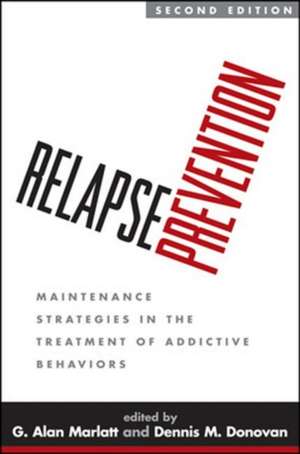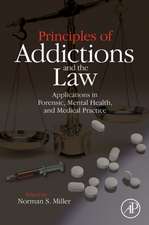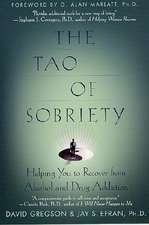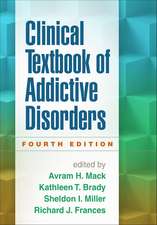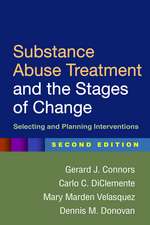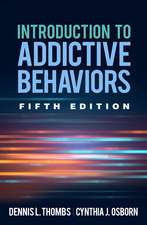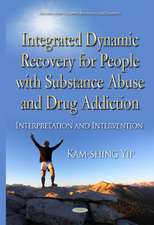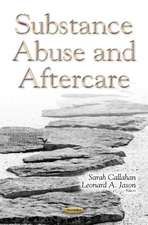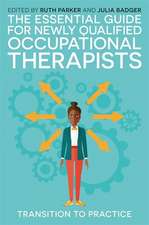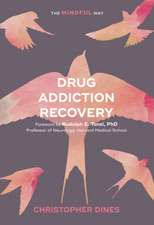Relapse Prevention, Second Edition: Maintenance Strategies in the Treatment of Addictive Behaviors
Editat de G. Alan Marlatt, Dennis M. Donovanen Limba Engleză Paperback – 21 feb 2008
This important work elucidates why relapse is so common for people recovering from addictive behavior problems--and what can be done to keep treatment on track. It provides an empirically supported framework for helping people with addictive behavior problems develop the skills to maintain their treatment goals, even in high-risk situations, and deal effectively with setbacks that occur. The expert contributors clearly identify the obstacles that arise in treating specific problem behaviors, review the factors that may trigger relapse at different stages of recovery, and present procedures for teaching effective cognitive and behavioral coping strategies.
Preț: 340.22 lei
Preț vechi: 358.12 lei
-5% Nou
Puncte Express: 510
Preț estimativ în valută:
65.11€ • 70.70$ • 54.69£
65.11€ • 70.70$ • 54.69£
Carte disponibilă
Livrare economică 01-15 aprilie
Livrare express 15-21 martie pentru 36.66 lei
Preluare comenzi: 021 569.72.76
Specificații
ISBN-13: 9781593856410
ISBN-10: 1593856415
Pagini: 416
Ilustrații: figures
Dimensiuni: 156 x 234 x 26 mm
Greutate: 0.59 kg
Ediția:2 Rev ed.
Editura: Guilford Publications
Colecția Guilford Press
ISBN-10: 1593856415
Pagini: 416
Ilustrații: figures
Dimensiuni: 156 x 234 x 26 mm
Greutate: 0.59 kg
Ediția:2 Rev ed.
Editura: Guilford Publications
Colecția Guilford Press
Public țintă
Postgraduate, Professional, Professional Practice & Development, and UndergraduateCuprins
1. Relapse Prevention for Alcohol and Drug Problems, G. Alan Marlatt and Katie Witkiewitz
2. Relapse Prevention among Diverse Populations, Arthur W. Blume and Berenice García de la Cruz
3. Treating Alcohol Problems, Ronald M. Kadden and Ned L. Cooney
4. Relapse Prevention for Smoking, Saul Shiffman, Jon Kassel, Chad Gwaltney, and Dennis McChargue
5. Relapse Prevention for Stimulant Dependence, Kathleen M. Carroll and Richard A. Rawson
6. Relapse Prevention for Opioid Dependence, Nancy A. Haug, James L. Sorensen, Valerie A. Gruber, and Yong S. Song
7. Relapse Prevention for Cannabis Abuse and Dependence, Roger A. Roffman and Robert S. Stephens
8. Relapse Prevention for Abuse of Club Drugs, Hallucinogens, Inhalants, and Steroids, Jason R. Kilmer, Jessica M. Cronce, and Rebekka S. Palmer
9. Relapse Prevention for Eating Disorders and Obesity, R. Lorraine Collins
10. Treatment of Gambling Disorders, Howard J. Shaffer and Debi A. LaPlante
11. Enhancing the Relapse Prevention Model for Sex Offenders: Adding Recidivism Risk Reduction Therapy to Target Offenders' Dynamic Risk Needs, Jennifer G. Wheeler, William H. George, and Susan A. Stoner
12. Relapse Prevention for Sexually Risky Behaviors, Tina M. Zawacki, Susan A. Stoner, and William H. George
2. Relapse Prevention among Diverse Populations, Arthur W. Blume and Berenice García de la Cruz
3. Treating Alcohol Problems, Ronald M. Kadden and Ned L. Cooney
4. Relapse Prevention for Smoking, Saul Shiffman, Jon Kassel, Chad Gwaltney, and Dennis McChargue
5. Relapse Prevention for Stimulant Dependence, Kathleen M. Carroll and Richard A. Rawson
6. Relapse Prevention for Opioid Dependence, Nancy A. Haug, James L. Sorensen, Valerie A. Gruber, and Yong S. Song
7. Relapse Prevention for Cannabis Abuse and Dependence, Roger A. Roffman and Robert S. Stephens
8. Relapse Prevention for Abuse of Club Drugs, Hallucinogens, Inhalants, and Steroids, Jason R. Kilmer, Jessica M. Cronce, and Rebekka S. Palmer
9. Relapse Prevention for Eating Disorders and Obesity, R. Lorraine Collins
10. Treatment of Gambling Disorders, Howard J. Shaffer and Debi A. LaPlante
11. Enhancing the Relapse Prevention Model for Sex Offenders: Adding Recidivism Risk Reduction Therapy to Target Offenders' Dynamic Risk Needs, Jennifer G. Wheeler, William H. George, and Susan A. Stoner
12. Relapse Prevention for Sexually Risky Behaviors, Tina M. Zawacki, Susan A. Stoner, and William H. George
Notă biografică
G. Alan Marlatt, PhD, until his death in 2011, was Director of the Addictive Behaviors Research Center and Professor of Psychology at the University of Washington. For over 30 years, Dr. Marlatt conducted pioneering work on understanding and preventing relapse in substance abuse treatment and was a leading proponent of the harm reduction approach to treating addictive behaviors. He was a recipient of honors including the Jellinek Memorial Award for outstanding contributions to knowledge in the field of alcohol studies, the Robert Wood Johnson Foundation's Innovators Combating Substance Abuse Award, the Research Society on Alcoholism's Distinguished Researcher Award, and the Career/Lifetime Achievement Award from the Association for Behavioral and Cognitive Therapies.
Dennis M. Donovan, PhD, is Director of the Alcohol and Drug Abuse Institute, Professor in the Department of Psychiatry and Behavioral Sciences, and Adjunct Professor in the Department of Psychology at the University of Washington. He has published extensively in the area of substance abuse and addictive behaviors, with research funding from the National Institute on Alcohol Abuse and Alcoholism and the National Institute on Drug Abuse. He has served on the editorial boards of the Journal of Studies on Alcohol, Psychology of Addictive Behaviors, and Addiction. A member of a number of national professional organizations, Dr. Donovan is past president of the Society of Psychologists in Addictive Behaviors, and is a Fellow of Division 50 (Division on Addictions) of the American Psychological Association.
Dennis M. Donovan, PhD, is Director of the Alcohol and Drug Abuse Institute, Professor in the Department of Psychiatry and Behavioral Sciences, and Adjunct Professor in the Department of Psychology at the University of Washington. He has published extensively in the area of substance abuse and addictive behaviors, with research funding from the National Institute on Alcohol Abuse and Alcoholism and the National Institute on Drug Abuse. He has served on the editorial boards of the Journal of Studies on Alcohol, Psychology of Addictive Behaviors, and Addiction. A member of a number of national professional organizations, Dr. Donovan is past president of the Society of Psychologists in Addictive Behaviors, and is a Fellow of Division 50 (Division on Addictions) of the American Psychological Association.
Recenzii
A thoroughly revised and updated edition of an addictions classic! In comprehensive and practical chapters, the contributors critically review and discuss new developments in relapse prevention theory, research, and practice. Of particular interest is the volume's reconceptualization of the relapse process, which takes into account new research findings. A new chapter on relapse prevention among ethnic minorities is especially timely, and chapters on sexual risk behaviors, gambling disorders, and 'club drugs' document the expansion of relapse prevention to new problem areas. Clinicians, educators, and researchers should read--and reread--this book. Relapse Prevention, Second Edition, can be used as a primary text in graduate-level courses on addictive behavior. It also will serve well as a supplementary text in graduate-level courses on clinical practice and intervention research.--Meredith Hanson, DSW, Fordham University Graduate School of Social Service
People can overcome addictive behaviors, but doing so often requires time and multiple attempts. Many studies have taught us the importance of approaching treatment from a realistic perspective. In this second edition, the relapse model proffered by Marlatt for alcohol problems 20 years ago has now been extended to a dozen different addictive behaviors. Each chapter provides an overview of the management and prevention of relapse for specific problem areas. This book is absolutely essential for anyone working in the addictions field.--Linda Carter Sobell, PhD, Center for Psychological Studies, Nova Southeastern University
More than two decades ago, Alan Marlatt offered a way to analyze and prevent relapse that was one of those seminal insights that changed the field of addiction science forever. In the second edition of this influential work, Marlatt and Donovan provide an updated reconceptualization of the relapse process that incorporates cutting-edge research on craving, expectancies, contingencies, and self-regulation. Top scientist-practitioners offer a panoramic view of relapse prevention across the most extensive range of behaviors addressed in one place. Practitioners of all types, as well as researchers interested in the critical next questions facing the field, will appreciate this state-of-the-science volume and the clear treatment guidance it contains.--Carlo C. DiClemente, PhD, Department of Psychology, University of Maryland-Baltimore County
-People can overcome addictive behaviors, but doing so often requires time and multiple attempts. Many studies have taught us the importance of approaching treatment from a realistic perspective. In this second edition, the relapse model proffered by Marlatt for alcohol problems 20 years ago has now been extended to a dozen different addictive behaviors. Each chapter provides an overview of the management and prevention of relapse for specific problem areas. This book is absolutely essential for anyone working in the addictions field.--Linda Carter Sobell, PhD, Center for Psychological Studies, Nova Southeastern University
More than two decades ago, Alan Marlatt offered a way to analyze and prevent relapse that was one of those seminal insights that changed the field of addiction science forever. In the second edition of this influential work, Marlatt and Donovan provide an updated reconceptualization of the relapse process that incorporates cutting-edge research on craving, expectancies, contingencies, and self-regulation. Top scientist-practitioners offer a panoramic view of relapse prevention across the most extensive range of behaviors addressed in one place. Practitioners of all types, as well as researchers interested in the critical next questions facing the field, will appreciate this state-of-the-science volume and the clear treatment guidance it contains.--Carlo C. DiClemente, PhD, Department of Psychology, University of Maryland-Baltimore County
Offers clinicians a comprehensive approach to addressing relapse for drug and alcohol issues....For any clinician working with clients presenting with primary or co-occurring substance use issues, this book is a valuable resource that outlines effective relapse prevention strategies based on extensive research....Overall, this is an excellent resource and provides a comprehensive review of the current literature in the area of relapse prevention....The authors have captured changes in the field of relapse prevention for addictive behaviors in the past two decades and provide a comprehensive model of relapse based on extensive research. This book is a beneficial resource for all clinicians working with clients with drug and alcohol issues.
--Drug and Alcohol Review, 12/28/2007ƒƒProvides a comprehensive overview of the various applications of relapse prevention (RP). It suggested some new techniques for improving RP techniques so that they can address specific issues for individual clients and for more diverse populations. Also, it is most helpful to have a compendium of applications of the RP approach to various and diverse addictive disorders....It is an excellent resource for those who wish to review the range of addictive disorders that have been treated using RP techniques and the research findings so far.
--Addictive Disorders and Their Treatment, 12/28/2007ƒƒOffers clinicians a comprehensive update of the science and how it has been applied to major areas of addictive disorders....Each chapter offers a comprehensive review of the literature and empirical data where applicable. In addition, the experts attempt to address and apply the conventional wisdom of models of relapse prevention and areas for future study....It is a must-have resource for both seasoned clinicians and researchers....The book represents the next step in the evolution of understanding the complexity of relapse which is common for patients struggling to manage chemical and nonchemical addictive behaviors.
--Psychiatric Services, 12/28/2007Descriere
This important work elucidates why relapse is so common for people recovering from addictive behavior problems--and what can be done to keep treatment on track. It provides an empirically supported framework for helping people with addictive behavior problems develop the skills to maintain their treatment goals, even in high-risk situations, and deal effectively with setbacks that occur. The expert contributors clearly identify the obstacles that arise in treating specific problem behaviors, review the factors that may trigger relapse at different stages of recovery, and present procedures for teaching effective cognitive and behavioral coping strategies.
